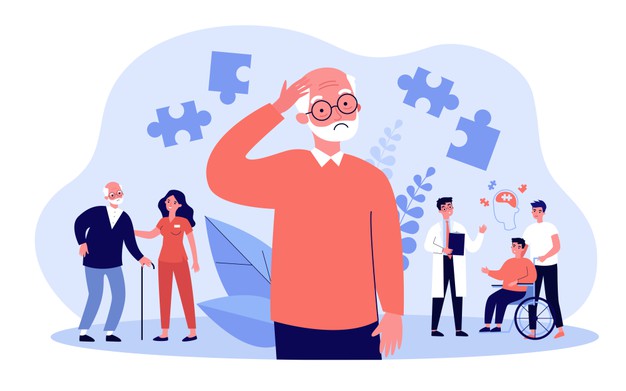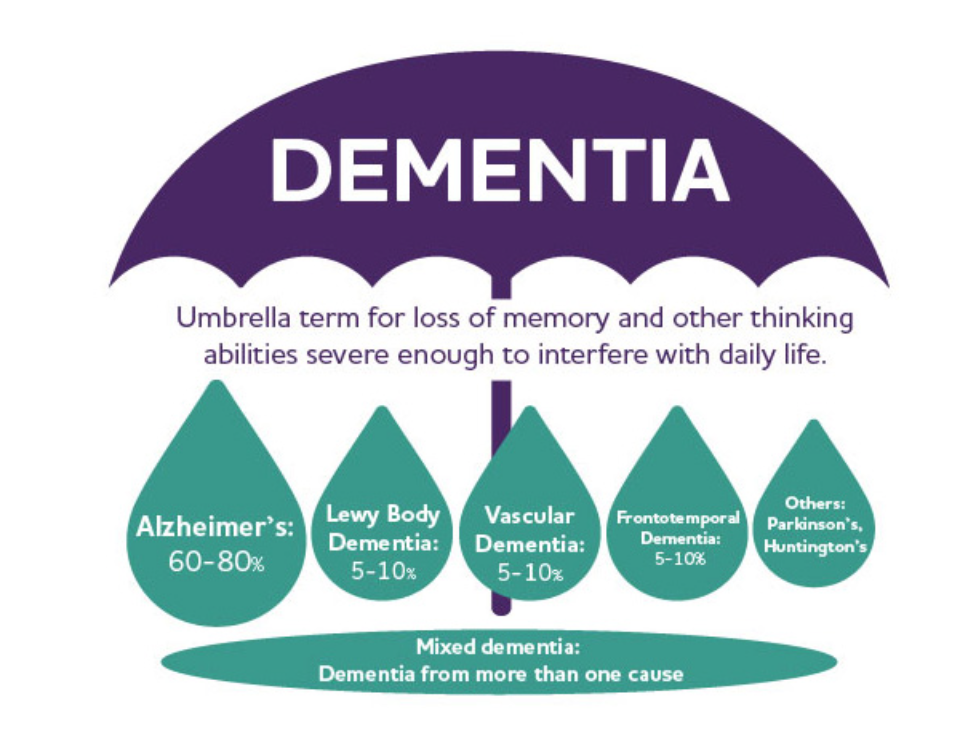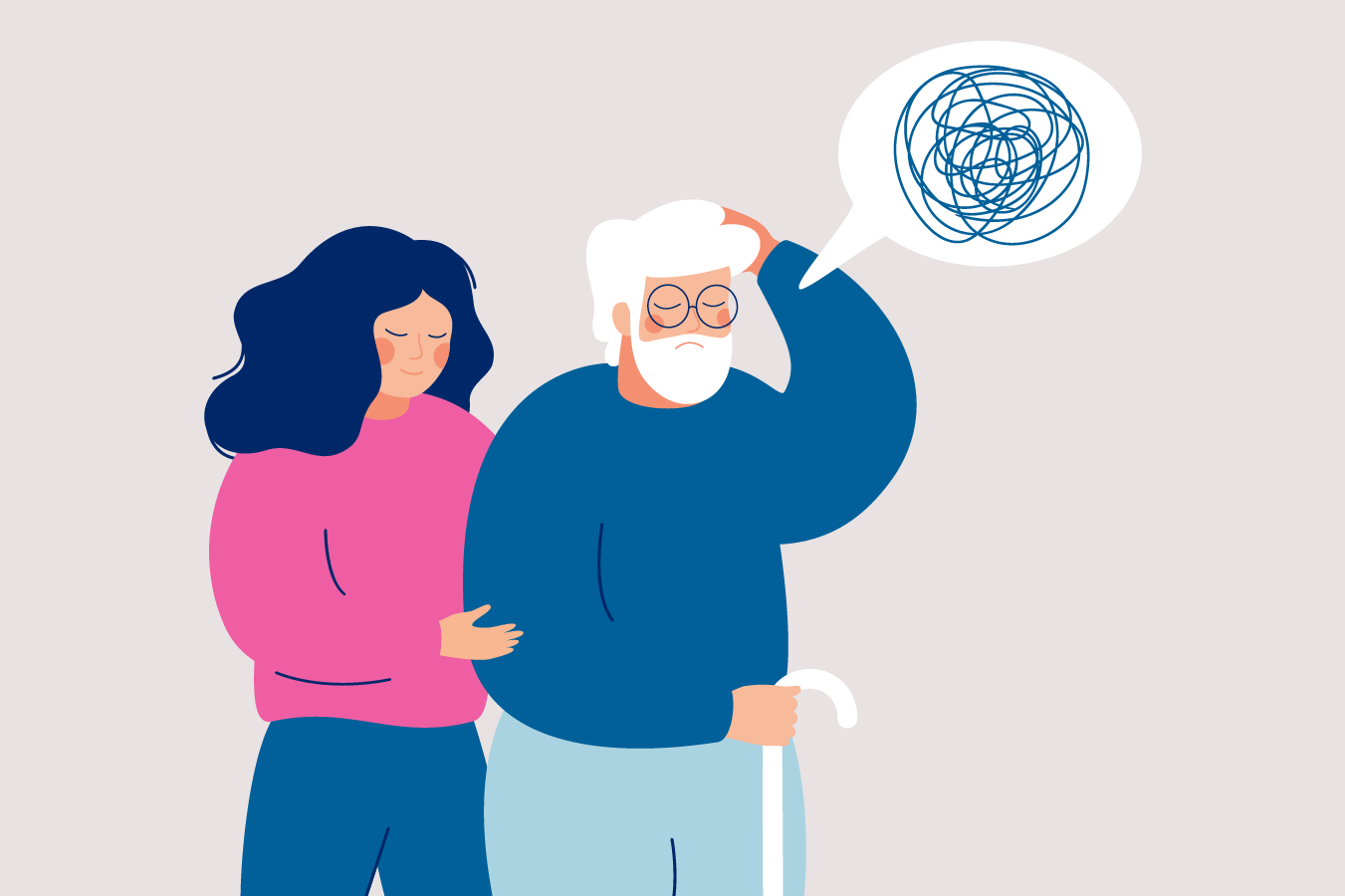What is dementia?
Dementia is an umbrella term used to describe the loss of memory, function, and overall thinking to the point where it disrupts daily living. There are several types of dementia with varying levels of severity. The most common form of dementia, which accounts for 60 – 80% of dementia cases is Alzheimer's Disease. And why dementia mainly affects older adults, it is not a normal part of the aging process.
Who is affected by dementia?
Dementia affects mostly older adults, especially those over the age of 65 years old. Dementia, however, is not a normal part of the aging process and many people live into their 80’s, 90’s, and beyond without any signs of dementia.
There are several different types of dementia that have different symptoms and different causes. According to the Centers for Disease Control and Prevention (CDC), several factors that can lead to dementia, which includes:

- Age – The strongest risk factor of dementia is age.
- Family History – Those with direct family members who suffer from dementia are also more likely to develop symptoms.
- Race/Ethnicity - According to the CDC older African Americans are twice more likely to have dementia than whites; Hispanics are 1.5 times more likely.
- Poor Heart Health – Overall poor health, a poor diet, high blood pressure, high cholesterol, and smoking can increase the risks of being diagnosed with a type of dementia.
Do I or someone I know suffer from dementia?
Symptoms of dementia
Since dementia is a broad term, there are specific types of dementia with different types of symptoms. There are also people with dementia who also have reversible causes such as side effects of medications, increased pressure in the brain, among other things. This is why it is important to work with a medical professional to figure screen for reversible causes if you or a loved one is concerned about having dementia.

General symptoms of dementia include:
- Loss of memory; Short term and longer-term
- Problems with attention
- Trouble with communication
- Forgetting routine tasks; Cooking, where you are going, etc.
- Problems related to judgement, reasoning, or problem-solving
- Loss of balance/coordination
There are many different types of dementia and different stages with varying levels of severity. This can make diagnosing a specific type of dementia difficult.
If you are concerned about yourself or a loved one having a form of dementia, talk to your family doctor or a health professional on how to get help.
Different Types of Dementia
Dementia is an umbrella term and not a specific disease. Dementia is used to refer to different mental conditions that affect the brain and a person’s overall coordination, focus, memory, etc.
Different types of dementia may affect different parts of the brain meaning that two people diagnosed with dementia may have very different symptoms, especially depending on the severity of the type of dementia they have.
Below are the most common types of dementia and some information about them:
Alzheimer's Disease: The most common type of dementia affecting anywhere between 60-80% of people with dementia. People suffering from Alzheimer’s Disease are most likely to forget recent events, such as a conversation or event happening minutes or hours beforehand. As the disease progresses, more distant memories may be forgotten. Impaired movement and coordination may also be a problem in the later stages of Alzheimer’s Disease.
Lewy Body Dementia: Sometimes confused at first with Alzheimer’s Disease because of early symptoms like memory loss and confusion. People with LBD eventually may have problems with balance or movement. Symptoms may also include changes in alertness levels, meaning they are sleepy during the day, have spells of confusion or staring.
Vascular Dementia: Vascular Dementia is a type of dementia linked to restricted blood flow or strokes within the brain. Diabetes, high cholesterol levels, and high blood pressure are all risk factors associated with vascular dementia. Changes to memory, thinking, and behavior are common symptoms.
Fronto-temporal Dementia: Damage to the brain’s frontal and temporal lobes can cause Fronto-temporal Dementia. Damage to nerve cells in the brain (neurons) eventually causes the neurons in the frontal and temporal lobes to die. This may lead to symptoms related to trouble communicating, unusual or irrational behavior, emotional problems, and difficulty organizing tasks or working. More information can be found on the National Institute on Aging’s website.
Mixed Dementia: Some individuals may have more than one type of dementia at the same time. This can be hard to diagnose since symptoms may overlap or mimic one another. The progression of dementia in individuals may occur faster in people with mixed dementia.
Diagnosis
There is no single test to test for and diagnose dementia. Healthcare providers can perform different tests relating to memory, attention, and cognitive abilities. Additionally, they will look at family history, medical history, and may perform different types of lab tests or brain scans to diagnose somebody with dementia.
A healthcare provider can usually diagnose dementia with a high level of certainty, but it may be difficult to know which type of dementia someone is suffering from. In some cases, individuals may be sent to be examined by specialists to help further diagnose.
How do I treat dementia?
Treatment options for dementia are limited and depend on the underlying causes. For most forms, like Alzheimer’s Disease, there is no specific type of treatment. There may be different types of medications used to help symptoms related to anxiety or changes in a person’s behavior.
The best way to treat dementia is to prevent it from happening to the best of your ability. Leading a healthy lifestyle, exercising regularly, eating a healthy diet, and staying active socially are great ways to decrease your chances of getting dementia.

Resources
Alzheimer’s Association website – Great source of information on dementia and Alzheimer’s Disease, as well as different statistics and resources for help and support.
CDC website
Sources
https://www.nia.nih.gov/health/what-dementia-symptoms-types-and-diagnosis
https://www.cdc.gov/aging/dementia/index.html
https://www.alz.org/alzheimers-dementia/what-is-dementia
https://www.nia.nih.gov/health/what-are-frontotemporal-disorders